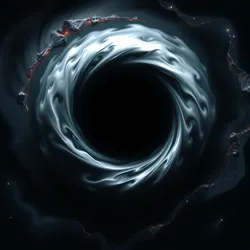Black Holes

A black hole is a region in space where the gravitational pull is so strong that nothing, not even light, can escape from it. They are formed when massive stars collapse under their own gravity at the end of their life cycles. Black holes are a fundamental aspect of cosmic phenomena and play a significant role in the dynamics of galaxies.
Types of Black Holes
Black holes are generally classified into three main types based on their mass:
-
Stellar Black Holes: Formed from the remnants of massive stars, these black holes typically have a mass ranging from about 3 to several tens of solar masses.
-
Intermediate Black Holes: These are hypothesized to exist with masses ranging from hundreds to thousands of solar masses. However, their existence is not yet fully confirmed.
-
Supermassive Black Holes: Found at the centers of galaxies, these black holes have masses ranging from millions to billions of solar masses. They are crucial in the formation and evolution of galactic structures.
Formation and Characteristics
Black holes form through the gravitational collapse of massive celestial bodies, such as stars. Once a black hole is formed, it is characterized by a boundary called the event horizon, beyond which nothing can escape. The point of no return is determined by the Schwarzschild radius, which depends on the black hole's mass.
Effects on Surrounding Matter
The intense gravitational pull of black holes affects their surroundings in various ways:
-
Accretion Disks: Matter spiraling into a black hole forms a rapidly rotating disk, heating up and emitting X-rays and other radiation as it descends.
-
Gravitational Lensing: Black holes can bend light from stars and galaxies behind them, acting as cosmic lenses that magnify distant objects.
-
Jets and Outflows: In some cases, matter falling into a black hole is ejected at high speeds, forming powerful jets that extend thousands of light-years into space.
Scientific Exploration
Black holes are an active area of research in astrophysics. They provide insights into general relativity and the nature of spacetime. The detection of gravitational waves from merging black holes has opened new avenues for understanding these enigmatic objects.
Theoretical Implications
The study of black holes has led to various theoretical implications, including the concepts of wormholes and the potential for time travel. These ideas, while speculative, have inspired both scientific inquiry and popular culture.
See Also
- Event Horizon Phenomena
- Galactic Dynamics
- Quantum Gravity Theories
- Cosmic Anomalies
Black holes remain one of the most intriguing and mysterious features of the universe, challenging our understanding of physics and the cosmos. As observational techniques advance, scientists continue to unravel the secrets held within these dark giants.